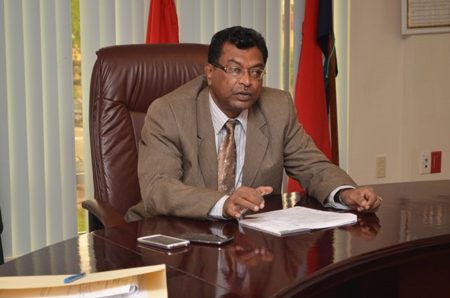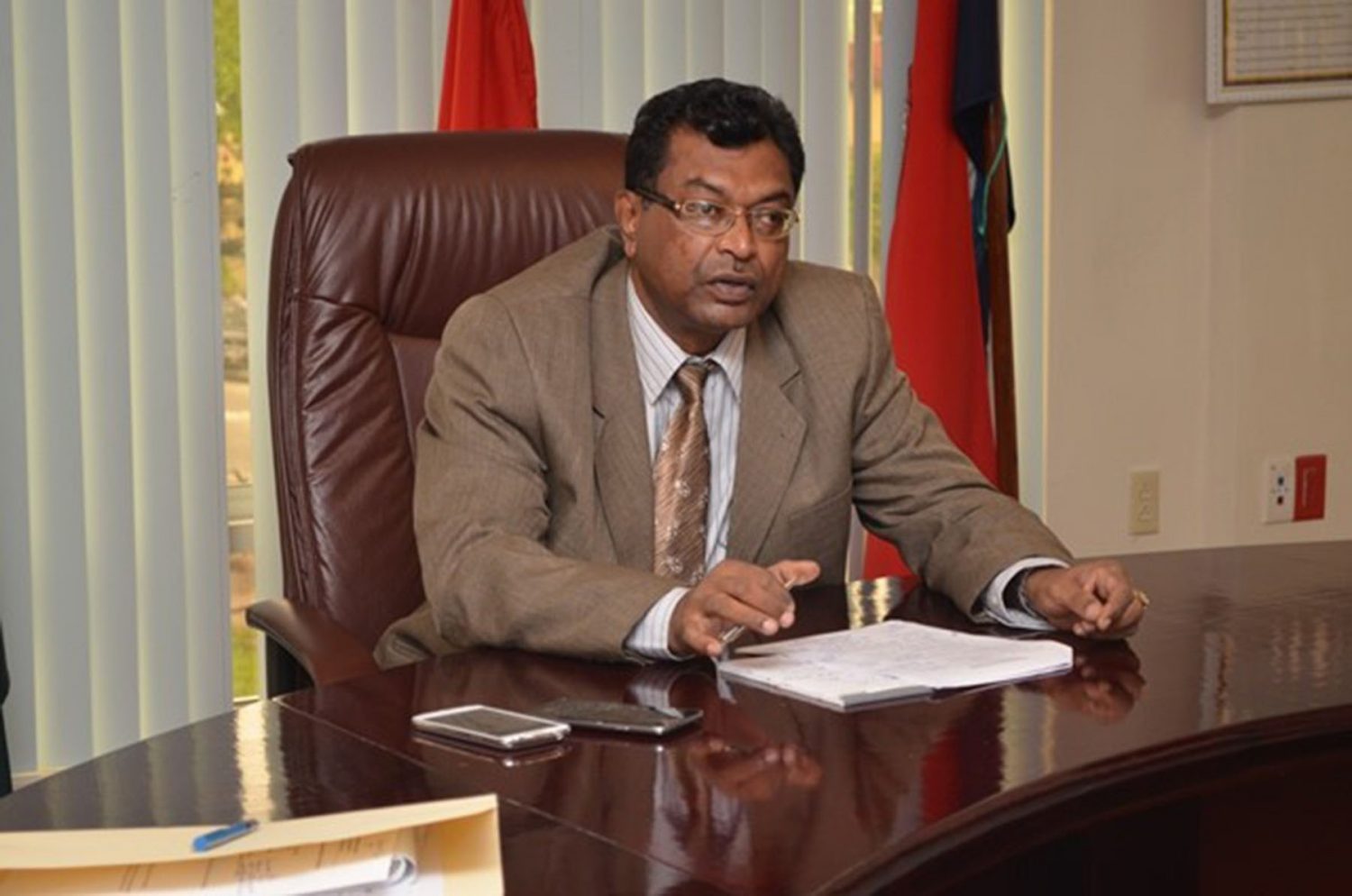Though the Commission of Inquiry (CoI) into the alleged plot to assassinate the president made strong recommendations that could see changes in the hierarchy of the Guyana Police Force, the extent of implementation is heavily dependent on discussions with the President and the Prime Minister, Minister of Public Security Khemraj Ramjattan said yesterday.
Ramjattan yesterday voiced his disappointment that the recommendations, which were handed over to President David Granger on August 31, were reported over the weekend in the state-owned Guyana Chronicle, ahead of those discussions.
“There were some strong recommendations made as was reported and I don’t know how that managed to be leaked like that but in any event…it should have reached there only after there was some discussion and deliberations on the recommendations,” he told reporters shortly after signing several contracts for works on several police stations and the Guyana Forensic Laboratory.

The Guyana Chronicle reported that retired Assistant Commissioner of Police Paul Slowe, who conducted the CoI, recommended that Commissioner of Police Seelall Persaud be removed or made to resign, acting Police Commissioner David Ramnarine be sanctioned and that there be a shake up within the Criminal Investigation Department (CID), inclusive of Crime Chief Wendell Blanhum being replaced.
On September 14, Ramjattan sought to dispel suspicions of a move to get rid of Crime Chief Blanhum, whom he called a “serious pillar” of the Police Force, while praising his performance. Blanhum, who heads the Criminal Investigation Department, is presently on 90 days of accumulated leave and is expected to return to office in December.Blanhum’s leave closely followed President Granger’s declaration that the recently-concluded Commission of Inquiry into the alleged assassination plot against him had exposed serious deficiencies and weaknesses in the Guyana Police Force.

Granger had also declared that he thought it was “unacceptable” to come to conclusions about the alleged plot before the completion of the investigation. “I think it is completely unacceptable for any public official to deem the allegation or the intention of the plot to assassinate the president of any country as being inherently incredible …that a person who [was] appointed to conduct an investigation, before completing the investigation to come to such conclusions,” he said, in an apparent reference to Blanhum’s testimony before the CoI, in which he had called the allegations of the assassination plot “inherently incredible.”
Due to the proximity of the president’s criticism and Blanhum proceeding on leave, speculation arose that he had been sent on leave because of the findings of the inquiry. However, Ramjattan was keen to dispel this notion on September 14.
“I notice a lot of people are saying that we are trying to get rid of Blanhum. Blanhum is a serious pillar in this police force… understand that and he has done a fantastic job in the opinion of the government, in the opinion of the minister,” Ramjattan told a press conference at the Alliance For Change headquarters. He explained that prior to 2015, Blanhum had accumulated in excess of 100 days of leave and requested earlier in the year, since May or June, to proceed on some of that leave.
The minister further explained that while the request was approved, Blanhum was unable to proceed on leave because of situations that required his presence. “All that is complete and he’s now on leave,” he added, while noting that he needs Blanhum back at the helm of the CID for the Christmas season, when there is usually a spike in crime.
The CoI was set up to investigate the alleged plot and the police force’s handling of the probe. Testimony at the public hearings for the inquiry had placed several senior ranks, including Blanhum, under scrutiny for their handling of the case. It also highlighted a fractious relationship within police force’s hierarchy, including a rift between Persaud and his second-in-command, Ramnarine. There were also several accusations of impropriety.
Approached for a comment on the matter yesterday, Ramjattan told reporters that while some serious recommendations were made, he preferred to withhold his views for the time being.
“…I did not want to make any statement publicly. I had wanted to discuss that with the relevant authorities—namely, the president and the prime minister—before, so I am not gonna make a comment on it,” he said.
Asked if he is sticking to this position even though articles related the contents of the report have been carried in the Guyana Chronicle newspaper, he responded in the affirmative, before adding that “there are lots of things that are already out there that I wouldn’t comment on.”
He added that the release of any information concerning the recommendations requires deliberations and stressed on the importance of “measured responses” being made. “Yes, there were some negatives found and yes we have to take care of that. We want a robust police force, we want security sector reform and we are in the process of that and the report did bring out a couple of things that ought not to have been done and to that extent I am going to make my statement as to whether all that was recommended must happen or all will not happen… [it] can have also negative consequences for an institution,” he said.
Stabroek News yesterday made inquiries about the availability of the report but an official at the Ministry of the Presidency indicated that it was still “classified.”
At the handing over ceremony Granger had indicated that the report will be made public after it is submitted to Cabinet. Members of the Cabinet usually meet every Tuesday.
Ramjattan was asked if cabinet has seen this report and he responded “not as far as I am aware.”
State Minister Joseph Harmon had previously told a press conference that the CoI had made recommendations that point to needed reform of the police force. “It certainly points to the need for some amount of reform. I would just wish to alert to that fact and not go too deeply into the other recommendations…,” he had said, before adding that he could not provide much detail about the contents of the final report as it still has to be reviewed by Cabinet.
Harmon said he did not wish to get into details but added that the report points to certain areas which require reform and which will be the subject of some input by British security advisor Russell Combe.
Granger has said that the inquiry has exposed serious deficiencies and weaknesses in the Police Force that have to be corrected. He has also signaled that its findings could potentially have a bearing on the delayed police promotions.
The president has been heavily criticised for directing the previously constituted Police Service Commission (PSC) to delay its consideration of a promotion list. The PSC subsequently decided not to proceed with the review. The president’s directive is being challenged in court. It is expected that the issue would be addressed once the PSC is reconstituted.






